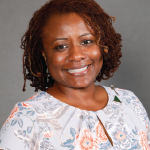It turned out that we were able to develop a fabulous course, called the Clinical Focus Course, that was hands on and on site, and included didactic education in the morning, followed by physical exams with real patients, and also provided practice on models for doing joint injections. It was a very in-depth, complex course, and we got such great feedback that we continued offering it for several years.
TR: How have you volunteered with the ARP since then?
Ms. Slusher: Most recently, I served on the ARP Practice Committee for a year, then chaired it for two years. In that committee, we created webinars introducing the concept of hiring an NP or PA into a rheumatology practice and explained why that would be a good thing for a rheumatologist to do. That was very interesting and a great experience as well.
I also was able to work on the Mentored Nurse Practitioner/Physician Assistant (NP/PA) Award for Workforce Expansion project, which we kicked off in 2019. It’s a Rheumatology Research Foundation-supported initiative that provides $25,000 for a practice that hires a new NP or PA. It took quite a bit of time to get that off the ground, but it’s been wildly successful, with 24 awards made so far.
TR: Has volunteering with the ARP benefited you personally?
Ms. Slusher: Oh yes. One of the reasons why it’s so important to volunteer is that you get to make relationships and friendships that maintain you throughout your career. For instance, I’m still great friends with Kori Dewing, ARNP, DNP, who was chair of the Clinical Focus Course Development task force at the time. A story within a story: She is now the ARP president-elect, set to take over after my term.
TR: Speaking of the ARP presidency, what are your top goals for the ARP in the coming year?
Ms. Slusher: I definitely want to make sure that our flagship courses are renewed. They are tremendous modular courses, so people can come in and take all the modules or just a few.
I also want to make sure that we focus on volunteers. Especially given the last two years we’ve gone through with the pandemic, we have found it harder to engage our volunteers. My focus is to find out more about our volunteers, how to encourage them and connect with them in this new virtual world, what their needs are and how to better integrate them into practices. I don’t believe there’s one particular answer, but I think we need to start taking a look at other models, including internationally, and finding out what our volunteers are capable of doing, what they’re doing in current practice and how we can pave the way to improve those efforts.



